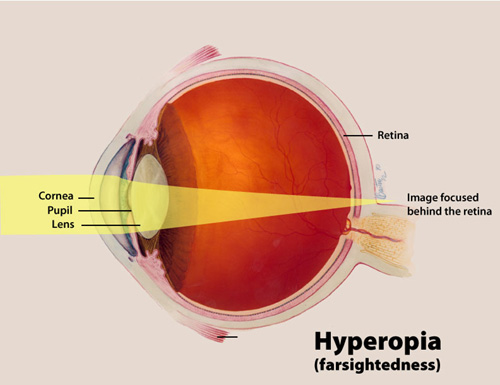Hyperopia
Hyperopia, also known as farsightedness, is a common type of refractive error where distant objects may be seen more clearly than objects that are near.
People experience hyperopia differently. Some people may not notice any problems with their vision, especially when they are young. For people with significant hyperopia, vision can be blurry for objects at any distance, near or far.
What is refraction?
Refraction is the bending of light as it passes through one object to another. Vision occurs when light rays are bent (refracted) as they pass through the cornea and the lens. The light is then focused on the retina. The retina converts the light-rays into messages that are sent through the optic nerve to the brain. The brain interprets these messages into the images we see.
What are refractive errors?
In refractive errors, the shape of the eye prevents light from focusing on the retina. The length of the eyeball (longer or shorter), changes in the shape of the cornea, or aging of the lens can cause refractive errors.

Hyperopia
How does hyperopia develop?
Hyperopia develops in eyes that focus images behind the retina instead of on the retina, which can result in blurred vision. This occurs when the eyeball is too short, which prevents incoming light from focusing directly on the retina. It may also be caused by an abnormal shape of the cornea or lens.
Who is at risk for hyperopia?
Hyperopia can affect both children and adults. It affects about 5 to 10 percent of Americans. People whose parents have hyperopia may also be more likely to get the condition.
Hyperopia and children
Hyperopia can affect children and interfere with their ability to learn; therefore, early diagnosis is important. In fact, National Eye Institute (NEI) published that
Uncorrected Farsightedness Linked to Literacy Deficits in Preschoolers. A study funded by the National Eye Institute (NEI), part of the National Institutes of Health, has shown that uncorrected farsightedness (hyperopia) in preschool children is associated with significantly worse performance on a test of early literacy.
American Optometric Association recommends scheduling eye examinations with an eye doctor for your child at ages 1, 3 and 5, where a thorough evaluation for hyperopia or other refractive errors should be performed.
What are the signs and symptoms of hyperopia?
The symptoms of hyperopia vary from person to person. Your eye care professional can help you understand how the condition affects you.
Common signs and symptoms of hyperopia include:
- Headaches
- Eyestrain
- Squinting
- Blurry vision, especially for close objects
How is hyperopia diagnosed?
An eye care professional can diagnose hyperopia and other refractive errors during a comprehensive dilated eye examination. People with this condition often visit their eye care professional with complaints of visual discomfort or blurred vision.
How is hyperopia corrected?
Hyperopia can be corrected with eyeglasses, contact lenses, or surgery.
Eyeglasses are the simplest and safest way to correct hyperopia. Your eye care professional can prescribe lenses that will help correct the problem and help you see your best.
Contact Lenses work by becoming the first refractive surface for light rays entering the eye, causing a more precise refraction or focus. In many cases, contact lenses provide clearer vision, a wider field of vision, and greater comfort. They are a safe and effective option if fitted and used properly. However, contact lenses are not right for everyone. Discuss this with your eye care professional.
Refractive Surgery aims to permanently change the shape of the cornea which will improve refractive vision. Surgery can decrease or eliminate dependency on wearing eyeglasses and contact lenses. There are many types of refractive surgeries and surgical options should be discussed with an eye care professional.
Education Navigation
- Monday: 9:00AM - 6:00PM
- Tuesday: 9:00AM - 6:00PM
- Wednesday: 9:00AM - 6:00PM
- Thursday: 9:00AM - 6:00PM
- Friday: 9:00AM - 2:00PM
- Saturday: CLOSED
- Sunday: CLOSED
